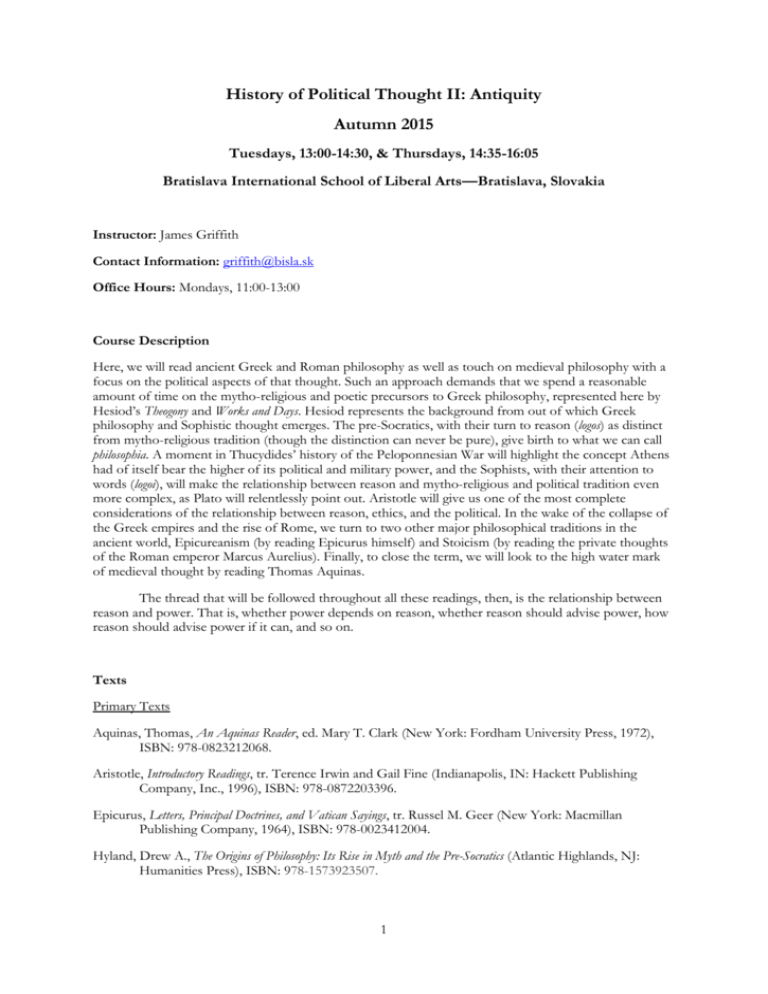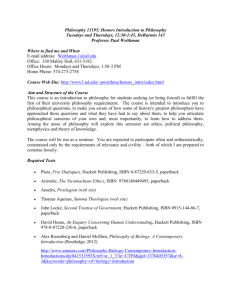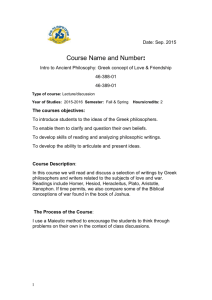History of Political Thought II: Antiquity Autumn 2015
advertisement

History of Political Thought II: Antiquity Autumn 2015 Tuesdays, 13:00-14:30, & Thursdays, 14:35-16:05 Bratislava International School of Liberal Arts—Bratislava, Slovakia Instructor: James Griffith Contact Information: griffith@bisla.sk Office Hours: Mondays, 11:00-13:00 Course Description Here, we will read ancient Greek and Roman philosophy as well as touch on medieval philosophy with a focus on the political aspects of that thought. Such an approach demands that we spend a reasonable amount of time on the mytho-religious and poetic precursors to Greek philosophy, represented here by Hesiod’s Theogony and Works and Days. Hesiod represents the background from out of which Greek philosophy and Sophistic thought emerges. The pre-Socratics, with their turn to reason (logos) as distinct from mytho-religious tradition (though the distinction can never be pure), give birth to what we can call philosophia. A moment in Thucydides’ history of the Peloponnesian War will highlight the concept Athens had of itself bear the higher of its political and military power, and the Sophists, with their attention to words (logoi), will make the relationship between reason and mytho-religious and political tradition even more complex, as Plato will relentlessly point out. Aristotle will give us one of the most complete considerations of the relationship between reason, ethics, and the political. In the wake of the collapse of the Greek empires and the rise of Rome, we turn to two other major philosophical traditions in the ancient world, Epicureanism (by reading Epicurus himself) and Stoicism (by reading the private thoughts of the Roman emperor Marcus Aurelius). Finally, to close the term, we will look to the high water mark of medieval thought by reading Thomas Aquinas. The thread that will be followed throughout all these readings, then, is the relationship between reason and power. That is, whether power depends on reason, whether reason should advise power, how reason should advise power if it can, and so on. Texts Primary Texts Aquinas, Thomas, An Aquinas Reader, ed. Mary T. Clark (New York: Fordham University Press, 1972), ISBN: 978-0823212068. Aristotle, Introductory Readings, tr. Terence Irwin and Gail Fine (Indianapolis, IN: Hackett Publishing Company, Inc., 1996), ISBN: 978-0872203396. Epicurus, Letters, Principal Doctrines, and Vatican Sayings, tr. Russel M. Geer (New York: Macmillan Publishing Company, 1964), ISBN: 978-0023412004. Hyland, Drew A., The Origins of Philosophy: Its Rise in Myth and the Pre-Socratics (Atlantic Highlands, NJ: Humanities Press), ISBN: 978-1573923507. 1 Marcus Aurelius, Meditations, tr. A.S.L. Farquharson (Oxford: Oxford University Press, 2008), ISBN: 9780199540594. Plato, Complete Works, eds. John M. Cooper and D.S. Hutchinson (Indianapolis, IN: Hackett Publishing Company, Inc., 1997), ISBN: 978-0872203495. Thucydides, The Peloponnesian War, tr. Martin Hammond (New York: Oxford University Press, 2009), ISBN: 978-019281911. Secondary Text Nails, Debra, The People of Plato: A Prosopography of Plato and Other Socratics (Indianapolis, IN: Hackett Publishing Company, Inc., 2002), ISBN: 978-0872205642. Course Requirements and Grade Distribution 80%: Four papers, each worth 20% of the final grade. 750-1500 words for each paper. Topics will be dealt with as the term progresses. 10%: Two to three Text Questions on the text at hand due each week. These should be thoughtful engagements with the text, not merely questions of factual clarification, and will frequently serve as the basis of our discussion. 7.5%: Class Participation is encouraged and expected. Attendance does not qualify as participation. 2.5%: Attendance is mandatory. I will allow two unexcused absences for the term. Lateness of more than 15 minutes qualifies as an absence. Other Issues and Concerns Academic Integrity In this context, “academic integrity” primarily refers to plagiarism. Plagiarism is the taking of anyone’s previously written work and attempting to pass it off as new and/or your own. This includes not citing material that should be cited, even if you are not directly quoting a given source. It is a serious offense and BISLA’s Plagiarism and Cheating Policy will be followed strictly if it occurs. This policy can be found in the Moodle folder for this course. NB: This document also has helpful strategies for avoiding plagiarism. Expectations in the Classroom You are all adults and should expect to be treated that way, by everyone in the classroom. You are also expected to treat others like adults. If you have questions, you need to ask them, in and out of class. If you are busy with other aspects of your life, they cannot interfere here—in other words, turn off your cell phones and other such devices, including WiFi access. If you have to use the bathroom, you do not need to ask me, but bear in mind how distracting that can be for others. If you have something to say that does not pertain to the discussion, wait until after class. In short, act like the adult you are and respect the classroom environment. 2 Writing Expectations To be able to write clearly means you are thinking clearly. Thus, even your Text Questions should reflect a clarity of thought, a clarity of questioning. This does not mean that you are expected to write publishable papers. What it means is that you are expected to think about the sentences and paragraphs you write, whether they express your thoughts clearly and accurately, and if there may be better ways of expressing those thoughts. If you are having trouble finding the right words, sentences, or paragraphs—or discover you are having trouble when you thought you were not—you should come see me and/or consult the Writing Tutors. *****This syllabus is subject to change.***** 3 Course Schedule Week 1—Thursday, September 17 Introduction Week 2—Tuesday, September 22 read: Hesiod, selections from Theogony and Works and Days (in Origins of Philosophy) Thursday, September 24 read: Xenophanes, fragments; Anaximander, fragment; Anaximenes, fragment (in Origins of Philosophy) bring to class: Text Questions Week 3—Tuesday, September 29 Thursday, October 1 read: Heraclitus, fragments (in Origins of Philosophy) read: Parmenides, fragments (in Origins of Philosophy) bring to class: Text Questions Week 4—Tuesday, October 6 read: Thucydides, Peloponnesian War, 2.35-46 Protagoras, fragments; Gorgias, “Defence of Palamêdês” (in Origins of Philosophy) bring to class: Text Questions Thursday, October 8 Week 5—Tuesday, October 13 NO CLASS: Reread, work on Paper read: Plato, Euthyphro submit: Paper on Hesiod, pre-Socratics, Thucydides, and/or Sophists Thursday, October 15 read: Plato, Apology, 17a-24b bring to class: Text Questions Week 6—Tuesday, October 20 Thursday, October 22 read: Plato, Apology, 24b-35d read: Plato, Crito, 43a-50c bring to class: Text Questions Week 7—Tuesday, October 27 read: Plato, Crito, 50c-54e ——; Republic; Bk. I, 327a-336a Thursday, October 29 read: Plato; Republic; Bk. I, 336a-342e bring to class: Text Questions Week 8—Tuesday, November 3 read: Plato; Republic; Bk. I, 342e-354c Aristotle; Physics; Bk. II, chs. 1 & 2 4 Thursday, November 5 read: Aristotle; Physics; Bk. II, ch. 3 ——; Metaphysics; Bk. I, ch. 1 bring to class: Text Questions Week 9—Tuesday, November 10 read: Aristotle; Metaphysics; Bk. I, ch. 2 ——; Nicomachean Ethics; Bk. I, chs. 1-8 submit: Paper on Plato Thursday, November 12 read: Aristotle; Nicomachean Ethics; Bk. I, chs. 9, 10, & 13 bring to class: Text Questions Week 10—Tuesday, November 17 Thursday, November 19 read: Aristotle; Nicomachean Ethics; Bk. II, chs. 1-7 read: Aristotle; Nicomachean Ethics; Bk. VIII, chs. 1-3 bring to class: Text Questions Week 11—Tuesday, November 24 read: Aristotle; Politics; Bk. I, chs. 1 & 2, & Bk. III, chs. 1, 4, 9, & 11 Thursday, November 26 read: Aristotle; Politics; Bk. III, ch. 12, & Bk. VII, ch. 1 bring to class: Text Questions Week 12—Tuesday, December 1 read: Aristotle; Politics; VII, chs. 2, 13, & 15 Epicurus, “Letter to Menoeceus” Thursday, December 3 read: Marcus; Meditations; Bk. III bring to class: Text Questions Week 13—Tuesday, December 8 read: Marcus; Meditations; Bk. IV Aquinas, Reader, pp. 355-359 submit: Paper on Aristotle Thursday, December 10 read: Aquinas, Reader, pp. 359-363 bring to class: Text Questions Week 14—Tuesday, December 15 Thursday, December 17 read: Aquinas, Reader, pp. 363-379 read: Aquinas, Reader, pp. 379-387 bring to class: Text Questions Week 15—Tuesday, December 22 read: Paper on Epicurus, Marcus, and/or Aquinas 5









